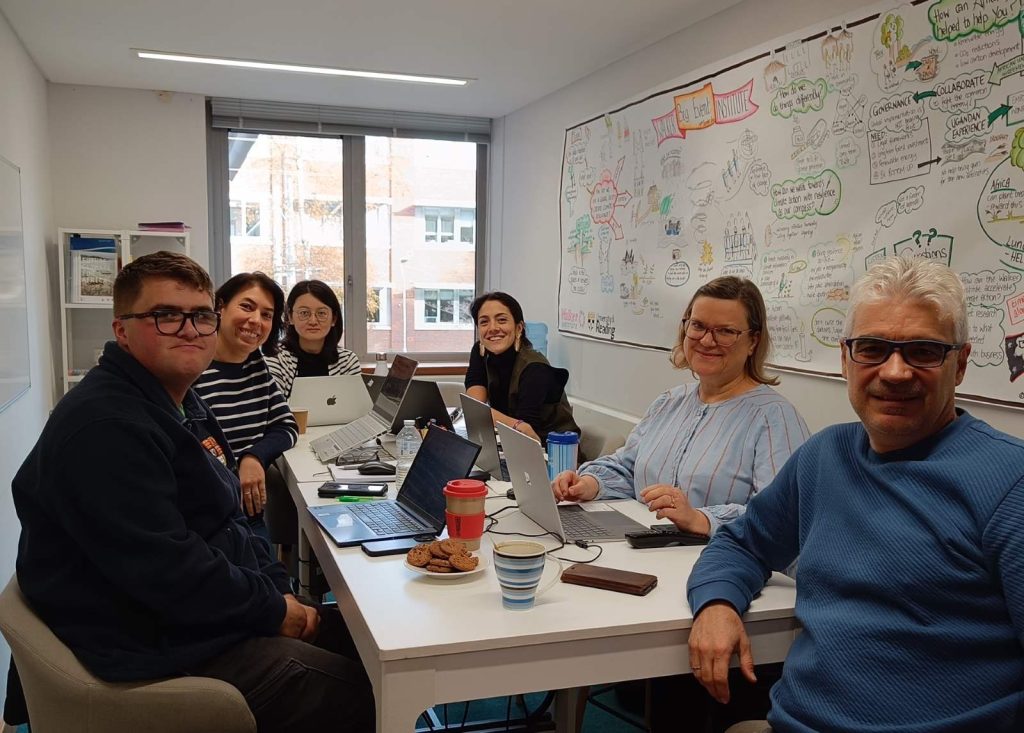
G. Ryan, F. Pillosu, Y.Ren, N. Pain, Eme Dean-Lewis, Prof. A. Mihailov attending the COP Climate Action Studio; Nov 2024
Written by Dr Yan Ren, visiting researcher from Lanzhou University, China.
When I first arrived at the University of Reading in September 2024, I didn’t expect how much this experience would change me. As a visiting researcher from Lanzhou University, my original focus was on boundary layer turbulence, but I soon found myself part of a much wider and more active academic environment. Thanks to the kind invitation from Professor Rosalind Cornforth and the open, interdisciplinary atmosphere at the Walker Institute, this visit has become an important stage in my academic journey. Seven months have passed, and in this blog, I would like to share some of my experiences so far, such as the connections I’ve made, the collaborations I’ve explored, and how this journey has helped me see climate research in new ways. I’m also looking forward to continuing this exciting work in the next five months.
One of the highlights of my time at the Walker Institute has been joining the My Climate Risk Interdisciplinary Learning Group, a monthly event that brings together researchers from different fields to discuss climate risk. They gave me valuable opportunities to think across disciplines. These discussions encouraged me to explore how my own research on boundary layer turbulence could connect with broader issues like climate adaptation. The Walker Institute also plays an active role in the UNFCCC process and organizes the University of Reading’s participation in the annual COP meetings. From 11 to 22 November 2024, I joined the COP29 conference online, together with staff and students from the university. We watched live sessions, discussed the key messages, and read related documents as a group. I was deeply impressed by how the Walker Institute brings global climate policy into academic research and teaching. It also made me think about how this kind of model could be applied in postgraduate education at Lanzhou University.

Dr Yan Ren giving a talk at the Department of Meteorology, University of Reading
In addition to the events at the Walker Institute, I also took part in many academic activities across the university. These included the regular seminars of the National Centre for Atmospheric Science (NCAS), the Monday seminars, and the Tuesday PhD presentations in the Department of Meteorology. I was also invited to give a talk in one of the Monday seminars, titled “Weak Turbulence and Turbulence Intermittency in the Stable Boundary Layer and Their Applications in Haze Pollution Processes.” After the talk, I received encouraging feedback from researchers working in different areas. Professor Ted Shepherd, who studies large-scale atmospheric waves, kindly shared one of his recent review papers with me, which turned out to be highly relevant to my research. I also had several interesting discussions with Professor Janet Barlow and Dr. Veronica about their field experiments in Bristol, and they kindly invited me to visit the site and see the work in person. One especially exciting outcome of this talk was connecting with Professor Lichuan Wu from Uppsala University in Sweden. We are now planning a visit in June 2025 and working together on a plan for future collaboration. All of these opportunities have been made possible by the open, supportive, and interdisciplinary environment that the Walker Institute helps to create.
All of these meaningful and enjoyable experiences have shown me that real academic progress comes not only from data and results in the lab, but also from open conversations across disciplines, international collaboration, and staying connected to real-world challenges. With the platform and support provided by the Walker Institute, I’ve been able to take my research further, explore it from new and deeper perspectives.

